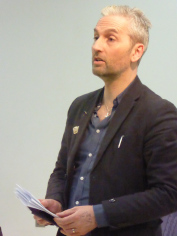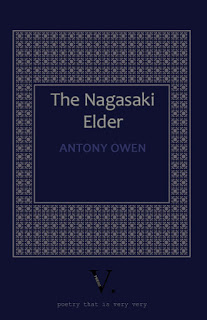Readings at the Hive, Worcester: Spring 2018
In the last few of months I have hosted a couple of poetry readings at the Hive in Worcester, showcasing some of the work published in the last year that I believe is not only poignant and well-written, but important for starting sometimes difficult political conversations about the nature of our culture.
In March, I invited Antony Owen to read from his latest V Press collection, The Nagasaki Elder. The poems confront war and destruction with pain-staking honesty, but also tenderness making this collection haunting and unforgettable. Antony spoke with passion about the people he had met on his trip to Hiroshima, being able to provide shocking and horrific accounts of the brutality and futility of war. How incredible that Antony was able to take something so deathly and destructive, and turn it into such beautiful poetry? Poetry which centres on peace and humanity. It is no wonder that this collection was very recently shortlisted for the Ted Hughes Award for New Work in Poetry 2017. You can read a full account of the evening here.


In April, I invited Deborah Alma, otherwise known as the Emergency Poet, to Worcester to showcase her recently edited collection of women's poetry, #MeToo (published by Fair Acre Press). I cannot stress how important this collection of poetry is for claiming space in what is still a society that sees two women a week die at the hands of domestic violence. This is poetry that acknowledges and legitimises the experiences of women, no longer prepared to remain silent about harrassment, abuse and violence. This was a powerful evening of poetry, as guest poets 'hid' amongst the audience and emerged without prompt or introduction to perform their poems and the work of others in the collection. This quietly political act helped to signify that we will not accept a culture of violence and degredation towards women, which is also equally harmful to men. Although moving, painful and sometimes uncomfortable, the reading was also uplifting and powerful, especially the closing poem, Spartaca. This collection feels like it might mark a turning point in history, where the women's movement is once again marked by visceral energies as well as cerebral concerns.


